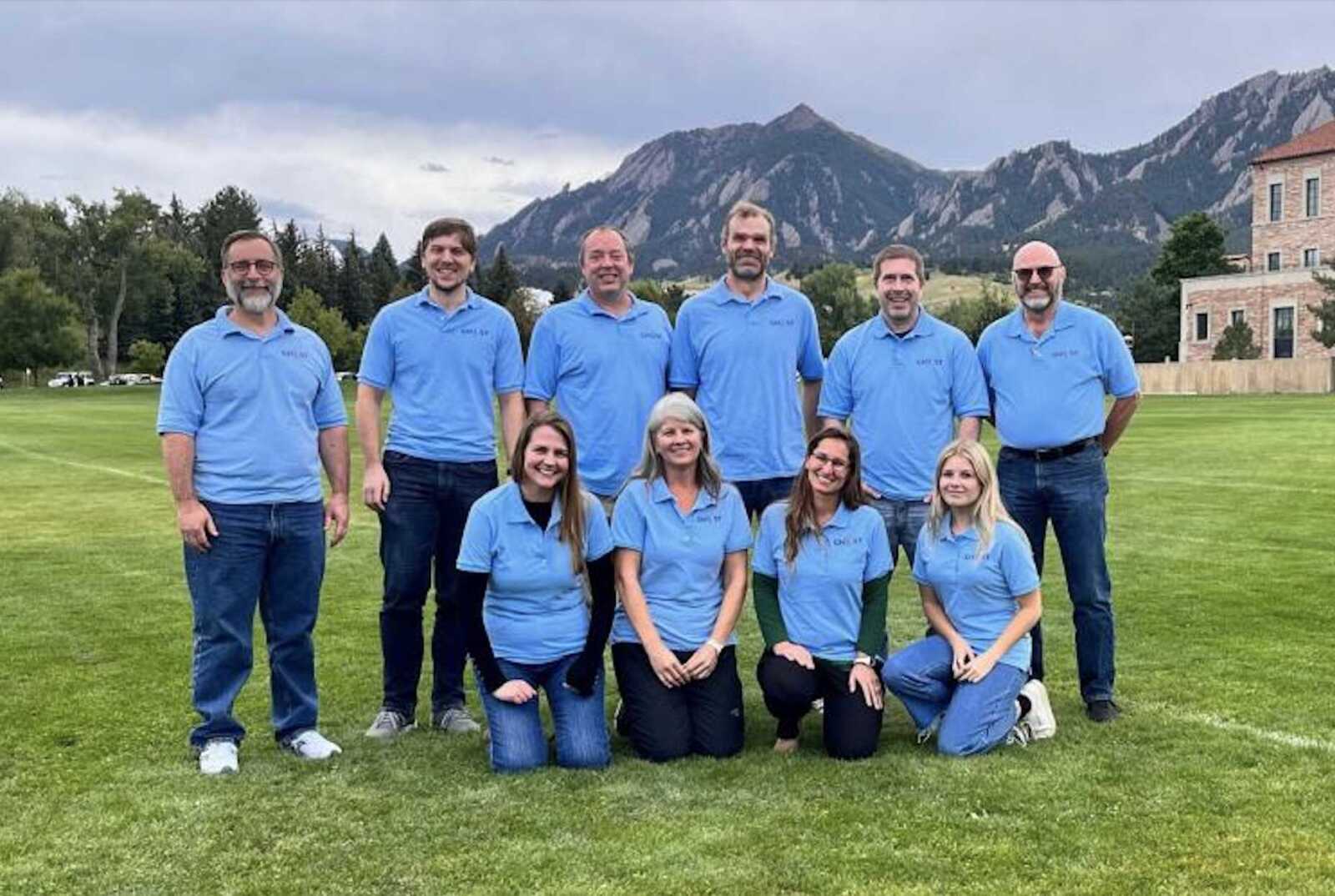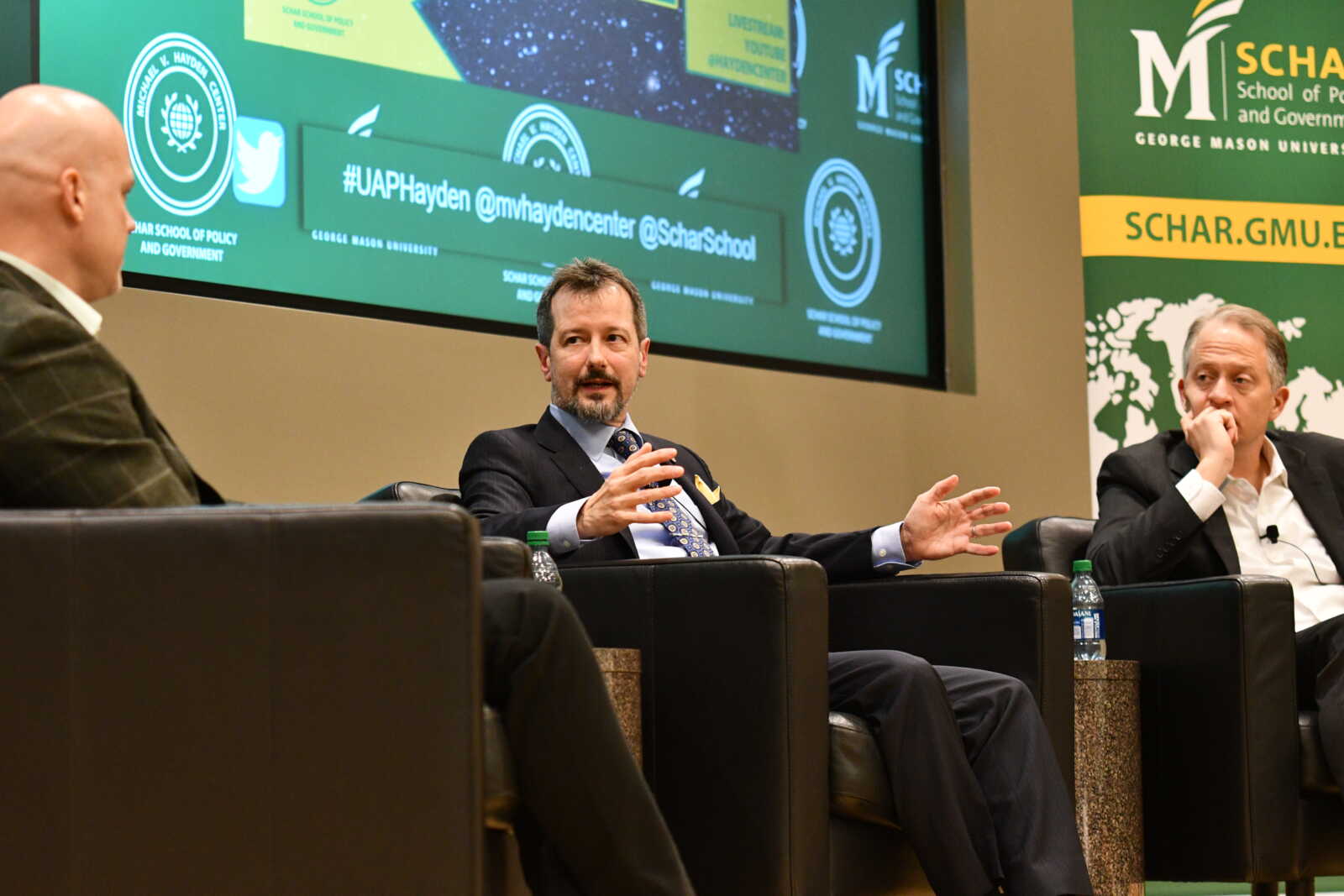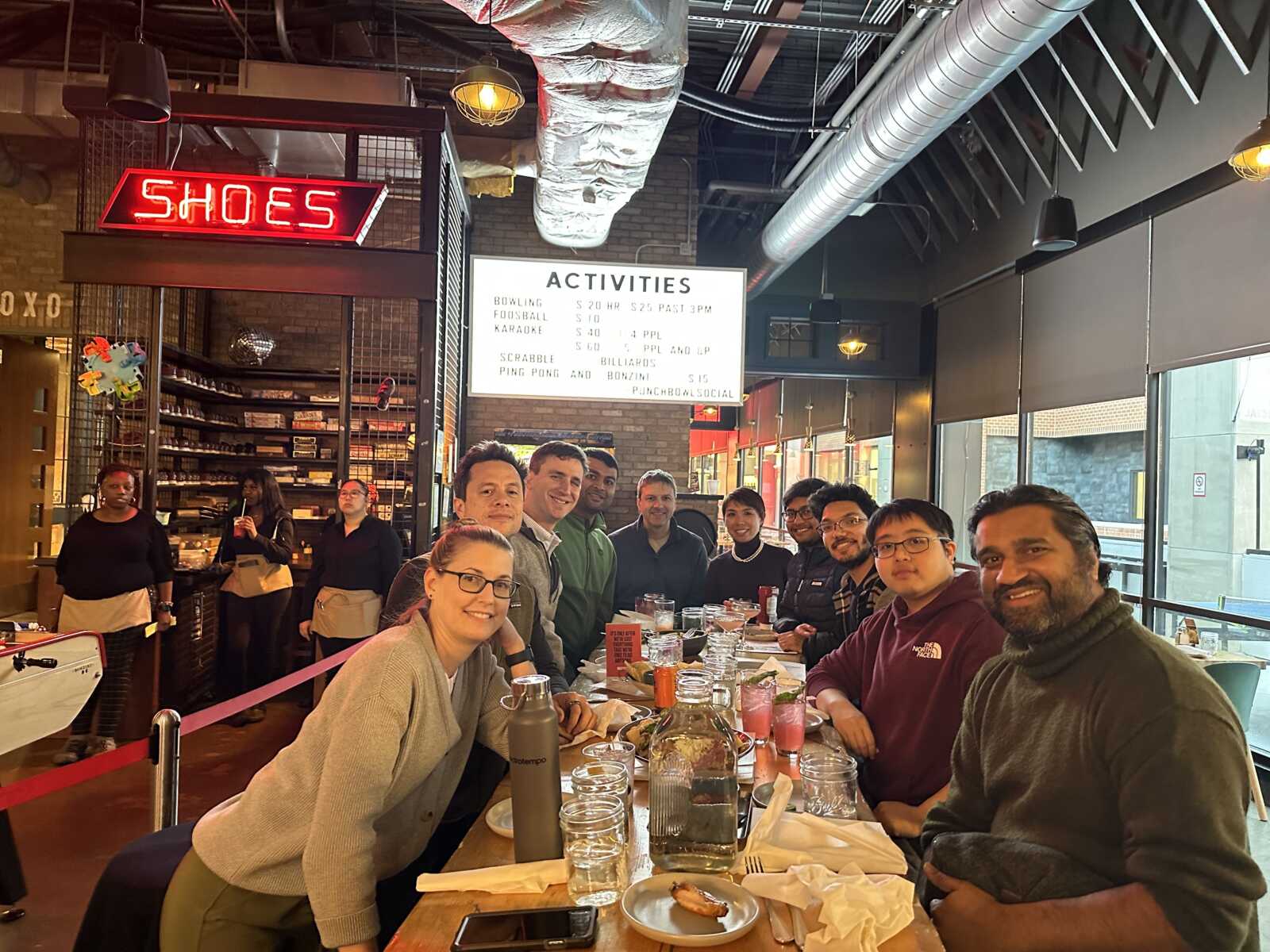Sponsored by Monday Properties and written by ARLnow, Startup Monday is a weekly column that profiles Arlington-based startups, founders, and other local technology news. Monday Properties is proudly featuring Three Ballston Plaza.
By the time Arlington native Roger Nowakowski graduated from Yorktown High School, he had already founded and sold his first startup venture.
Nowakowski, who grew up in the Woodmont neighborhood, built an app for people trying to get their hands on the next hot product in the luxury goods market — especially sneakerheads. He founded it at 16, as a high school sophomore when he was stuck at home at the height of the pandemic.
Limited-edition shoes from brands such as Nike and Adidas sell out online within seconds, which he says made it borderline impossible for a human to manually buy the product. His app allowed users to, for instance, purchase a single pair or mass quantities of shoes at the press of a button.
“Sneaker resellers would use my product to buy these hyped sneakers on drop in mass, to then sell on the aftermarket for profit,” he said noting, sneakers can sometimes sell at 10 times their retail price on the aftermarket.
Some 1,500 paying users made more than $1.4 million in purchases through the app before he sold it in 2021, when he was 17 years old. He graduated from Yorktown a year later and went straight into coding for other projects.
“I felt more alive than ever through the pursuit of knowledge out of genuine curiosity in areas I was passionate about,” he said. “After exiting from my first project, I was extremely eager to get back to work.”
For the next two years, he would work with a Miami-based team on a blockchain app for music artists. Now, he is a founding engineer at Waves, a venture capital-backed platform connecting brands looking to advertise with social media influencers.
It launched on the App Store this September, the Denver Business Journal reported.

“I was the first engineer and employee hire,” said Nowakowski. A colleague referred him to the founder of Waves, Bruce Weaver, when the platform was just an idea.
Typically, brands select leading influencers to make paid promotional posts to market their products. Waves allows people with smaller Instagram and TikTok followings to buy products from participating brands — at a discount — if they make promotional content within two weeks. Brands then pay creators based on how well this content does.
Waves is poised for significant growth next year, Nowakowski said.
“We’re setting ambitious milestones; 100,000 creators and processing over $1 million in total creator payouts,” he said. “We want to expand the creator economy while delivering unparalleled returns on ad spend for brands leveraging [user-generated content].”
Nowakowski credits his computer science teacher at Yorktown for helping him launch his first app — and thus, his career.
“At the time, Mr. [Greg] Rusk made an effort to align what we were learning in [computer science] with what I was building personally,” he said. “Not only was he a great teacher, but given his experience building software, he was easily relatable to, and guided me on the right path in class.”
Sponsored by Monday Properties and written by ARLnow, Startup Monday is a weekly column that profiles Arlington-based startups, founders, and other local technology news. Monday Properties is proudly featuring Three Ballston Plaza.
Ballston-based Federated Wireless is working with a university to secure 5G networks for U.S. soldiers and government operatives while abroad in possibly hostile countries.
It aims to develop a product that can secure 5G networks all over the world — even networks that are deployed by “potentially adversarial nations,” according to a press release.
That way, Americans abroad, whether in the military or part of a non-governmental organization, can use these networks without risking critical information falling into the hands of bad actors.
“The goal of the work is to ensure a range of users, from U.S. soldiers to commercial enterprises, can use 5G cellular networks in other countries, without those countries being able to extract valuable operational information,” Federated Wireless Chief Technology Officer Kurt Schaubach said in a statement.
Federated Wireless was selected to be the business partner for researchers at the University of Colorado Boulder leading the 2-year project, dubbed 5G Hidden Operations through Securing Traffic, or GHOST.
GHOST will explore disguising and anonymizing user identities, locations and traffic to prevent surveillance and analysis by hostile parties, the release said.
“This work is important for the United States because it inherently is about keeping our people safe,” said Eric Keller, a project researcher and CU Boulder associate professor, in a press release. “I’ve had the great fortune of being able to advise students at CU Boulder who were in the military, and hearing stories of situations they’ve been in really hits home the impact that GHOST could help keep them safer.”

The university and Federated Wireless recently received a $5 million grant from the National Science Foundation for the project.
The duo received a $750,000 NSF grant in September 2022 to fund the initial development of the technology. The $5 million grant will fund further work to develop a single prototype. At the end of the project, Federated Wireless and the university will decide what makes sense to commercialize.
“We’re excited to see where the research leads,” a spokeswoman for Federated Wireless told ARLnow.
Lead CU Boulder researcher Keith Gremban says Federated Wireless is the right partner for the project because it will provide valuable communications expertise and can rapidly build prototypes of “cutting-edge 5G concepts.”
“Their involvement helps enable us to build a prototype capable of securing 5G communications in the most difficult environments,” he said in a statement.

The head of the U.S. intelligence agency tasked with investigating alleged alien spacecraft sightings says it found no evidence of extraterrestrial life on Earth.
But that’s not necessarily good news, says Sean Kirkpatrick, director of the Pentagon’s All-Domain Anomaly Resolution Office (AARO).
Instead, Kirkpatrick fears the handful of the agency’s unresolved cases might be examples of unidentified, advanced earthly technologies instead of alien spacecraft, which poses a “big national security risk.”
“The best thing that could have happened in this job is to find the aliens because the alternative… is not a good thing,” Kirkpatrick said during a George Mason University panel on Unidentified Anomalous Phenomena, or UAP, last week.
The event — a few months after a memorable Congressional hearing on potential extraterrestrials this summer — focused on AARO’s findings from some 800 reported sightings and their implications for national security. While the vast majority of objects are benign, a small handful give Kirkpatrick pause.
“There was only about 2-4%, I think was around the number, that we have enough data for that are truly something we want to go dig in and go figure out what that is, and most everything else we can readily identify,” he said.
Most of the time, sightings wind up being everyday items, such as balloons, often misreported due to “training problems.”
“We have a number of pilots who will see these off in the distance, and there is an optical illusion that they will often see it’s called parallax,” he said.
“But they see it. They don’t understand it. They report it, and they write down in their report this is a UAP… they will clearly say, however, it looks like a balloon. It’s got a tether on it. It looks like it’s flying with the wind. But it because they mark it as a UAP it comes to us,” Kirkpatrick continued.
Before AARO’s inception in July 2022, there was very little serious analysis of UAP sightings, says Kirkpatrick, who is retiring next month.
His job, and that of AARO, has been to resolve reported sightings and develop a framework for evaluating sightings to use going forward.
First, Kirkpatrick says, scientists have to determine what the sensors that sensed a UAP are intended to detect, he says. Then, analysts compare these findings with information from the intelligence community on known entities or individuals who may be “doing something that matches those signatures.”
If the two groups disagree, Kirkpatrick says they try and get to a solution in what he affectionately called a “cage match.”
So far, no evidence of extraterrestrial life has been found. The unexplained 2-4% of cases — often resembling state-of-the-art earthly technologies, such as spherical drones — give him pause, however.
“We did a commercial drone survey and did some research going on out there and do you know what then the next biggest wave of drone technology is? Spherical drones,” he said. “Do you know why? Because they’re safe to use inside, so if they crash into people that, you don’t get hit in the head with a propeller.”
Kirkpatrick says AARO is working on ways to differentiate between earthly and alien tech signatures, though he believes the latter is far less likely.
“Now I know out in the universe, because of the vastness of the universe, it is — and I think most of the scientific community would agree with this — statistically impossible that there’s no life out there,” Kirkpatrick said. “Whether or not that’s intelligent life, whether or not they’ve traveled here, that is a diminishing probability as you go down that train.”
Sponsored by Monday Properties and written by ARLnow, Startup Monday is a weekly column that profiles Arlington-based startups, founders, and other local technology news. Monday Properties is proudly featuring Three Ballston Plaza.
Almost a year after its last merger, Arlington-based IT company C3 Integrated Solutions celebrated another major consolidation.
Last week, C3 announced its merger with Ingalls Information Security, a company based in Woodworth, Louisiana specializing in cybersecurity risk management for the defense industry.
C3 CEO Marc Pantoni says the merger is a response to evolving industry requirements concerning cybersecurity.
“Given how tightly integrated cybersecurity has become with day-to-day IT operations and compliance requirements, we believe it critical that we offer top-tier cybersecurity services that as part of our portfolio,” he wrote in a blog post.
The merger brings combines Ingalls’ expertise in Cybersecurity Maturity Model Certification (CMMC) — a Dept. of Defense (DoD) benchmark for cybersecurity in government-contracted companies — with C3’s managed IT and Microsoft Cloud solutions, according to a separate blog post by Ingalls CEO and founder Jason Ingalls.
“With this merger, our clients can now turn to a single service partner for all their needs without sacrificing quality of service,” Pantoni said. “That means a single source of accountability, increased cost efficiencies, and fewer partners to manage.”

The merger, akin to last year’s, aims to help clients navigate new Dept. of Defense guidelines which were recently updated to ensure contractors and subcontractors comply with stringent cybersecurity standards to safeguard sensitive, unclassified information.
“With CMMC soon becoming a baseline contractual requirement, defense contractors are looking for a partner to support them through their entire compliance journey,” the joint release said.
“As cybersecurity, IT, and compliance become increasingly intertwined, members of the DIB can now turn to C3 as a single managed services partner for all their IT, cybersecurity, and compliance needs without sacrificing quality of service,” the release continued.
Visitors to the Ballston Public Parking Garage this month may have noticed the absence of parking ticket kiosks and gates.
They were replaced with a new contactless parking system last month on Oct. 16.
If The county intended the change to improve the customer experience at the garage, which has garnered some negative online reviews over the past couple of years, but some users say they have found the new system confusing or restrictive.
Instead of getting a ticket at a gate, drivers entering the county-owned garage at 627 N. Glebe Road now park and then pay at a kiosk, online or through an app. There is a 15-minute grace period after entering the garage when parking is free, however, the new system keeps track of those in the facility by recording license plates upon entry.
Once parked, users can pay with cash or credit card at one of the many kiosks in each elevator lobby, after entering their license plate number and selecting an exit time. They can also pay through the Parking.com mobile app or by scanning a QR code that redirects them to a payment portal.
Here, users must enter their cell phone and license plate number, choose an exit time, and provide their credit card information, postal code and email address. This method, however, charges a 35-cent service fee.
In addition to creating more payment options, the county hopes the new system will “improve customer experience” by offering garage users the flexibility to add extra time as needed and stores their information for future transactions, says Melissa McMahon, the county’s parking and curb space manager.
Removing physical gates and automated ticket machines has allowed the “operations team to focus on customer experience and enforcement, rather than mechanical equipment malfunctions,” McMahon told ARLnow.
Several anonymous tipsters raised concerns about the poor internet connection inside the garage and the system’s reliance on smartphones.
“God forbid you don’t have a cell phone,” one tipster said.
Anticipating some confusion about the changes, McMahon said the county sent out letters to local community stakeholder groups and posted flyers throughout the garage. During the first month post-installation, garage staff were also posted around the facility to help users navigate the new system.
Still, several people said that the changes caught them “off guard.”
“Instead of a ticket at entry/exit, you are supposed to pay via the web (entering license plate into a form) or at a machine,” one tipster told ARLnow via email. “Luckily, there was a security guard sitting in the lobby off Level 3 asking people if they had paid and, if not, directing them to the machine. I know others did not realize they had to pay since the arms at the entry/exit lanes were all up.”
The same person who raised concerns about smartphone access also said the fliers were in “tiny print and difficult to understand.”
Individuals with concerns can contact the new garage operator, Chicago-based SP Plus, which provides a customer helpline and email support. County staff regularly visit the garage to “observe operations, talk to staff and customers, and work with garage management on refinements to improve customer experience,” says McMahon.
Sponsored by Monday Properties and written by ARLnow, Startup Monday is a weekly column that profiles Arlington-based startups, founders, and other local technology news. Monday Properties is proudly featuring Three Ballston Plaza.
Four Arlington-based startups have made it onto Deloitte’s 2023 North America Technology Fast 500 Rankings list, released last week.
- 29. GoTab, with 6,080% growth
- 372. Brazen, with 342% growth
- 423. Interos, with 287% growth
- 525. Govini, with 212% growth
Awardees were selected based on percentage fiscal year revenue growth from 2019 to 2022, which ranged anywhere from 201% to 222,189% but had an average growth rate of 1,934% and a median growth rate of 497%, per a press release.
“Each year, we look forward to reviewing the progress and innovations of our Technology Fast 500 winners,” said Paul Silverglate, vice chair, Deloitte LLP and U.S. technology sector leader, in a statement. “This year is especially celebratory as we expand the number of winners to better represent just how many companies are developing new ideas to progress our society and the world, especially during a slow economy.”

All four Arlington companies have seen big changes recently. For most, the challenges Covid presented became fuel for their achievements.
GoTab’s streamlined ordering platform tailored to customers and restaurant staff rocketed into the public eye during Covid, when venues had to adapt to contact-less interactions. It has since launched new platforms, raised millions and expanded into Canada.
The fintech company Interos was founded in 2005 but its mission — using artificial intelligence-powered software to help businesses identify disruptions to their supply chain — became especially relevant during Covid, which caused trade restrictions and product shortages.
In 2021, Interos became Arlington’s first private startup to reach “unicorn” status, or a $1 billion valuation. Between 2019 and 2021, the company grew by 303% and has had its platform used by NASA, the U.S Department of Defense and several Fortune 500 companies.
Brazen provides virtual and in-person recruiting solutions to speed up the hiring process and works with some of the top brands in the world, including 15% of the Fortune 100. It has been expanding since it raised $3 million in 2019, but saw a marked increase in interest during Covid, when virtual events became the norm.
It was recently acquired by the cloud-based talent acquisition software provider Radancy.
Govini uses data and machine learning to advance U.S. competitiveness and combat eroding military dominance. Its claims to fame include a $400 million indefinite delivery, indefinite quantity, 5-year contract for data and analytics with the Pentagon, which it landed in 2019.
This year, it launched Ark.ai, which uses AI and machine learning to scan commercially available data for information to address “challenges in supply chain, nuclear modernization, acquisition, procurement, science and technology and foreign influence,” per a press release.
The company tied its recent growth not to Covid but with other current events: China’s rise to power and Russia’s war with Ukraine.
“In the face of these threats, national security leaders have realized that maximizing the Defense Acquisition Process is the first step to building an enduring military advantage,” Govini CEO Tara Murphy Dougherty said in another press release.
“This shift is evident in our growth and the widespread adoption of our flagship product, Ark.ai, across the Department of Defense,” she continued. “Govini remains deeply committed to equipping the defense community with a platform that answers the growing call for rapid, data-informed acquisition.”
The outer structure of George Mason University’s $235 million expansion project in Arlington is complete.
The university celebrated the “topping out” milestone last Friday with tours of the under-construction FUSE at Mason Square structure on its Virginia Square campus.
During the event, students and faculty showcased the types of work the new, tech-oriented facility will house, including the development of robotic limbs and disaster simulation research.
The university broke ground on the 345,000-square-foot building at 3351 Fairfax Drive in January 2022. Previously, the site was home to the old Kann’s Department store, which was demolished in March 2021.
Construction is expected to be completed by the end of 2025. The new facility is expected to serve 750 students initially and up to 2,000 students within the next five years, according to a GMU spokesperson. It will dedicate 60% of its space to university programs and lease the remaining area for retail and private office use.
The building will house GMU’s Institute for Digital Innovation and the newly minted School of Computing, which will offer courses in artificial intelligence, data analytics and cybersecurity.
The Arlington campus is already a hub for several of GMU’s schools, spanning policy, law, conflict resolution and business.
The university’s president, Gregory Washington, told ARLnow that housing technology and social science disciplines under one roof will improve how society adopts new technologies, such as artificial intelligence.
“Engineers alone can’t do it. You need humanists. You need social scientists, and you need business people. We got all of them here working together on the next generation of problems,” he said. “That’s the difference you will see here that you don’t see many other places,”
Washington is also betting on the new facility in Arlington attracting talent that might otherwise choose bigger-name research institutions, such as the Massachusetts Institute of Technology.
“If you go to MIT, what you’ll find is that the facility we’re building is… better than 95% of the facilities they have,” he said.
During the event, Arlington Economic Development Director Ryan Touhill highlighted the potential for the new facility to energize the local tech sector, which has grown rapidly in recent years, particularly with the arrival of major tech companies like Amazon.
“This project can’t be coming online at a better time,” he said. “We’re really focused in Arlington County and regionally on growing our homegrown tech sector. And that’s part of our long-term economic growth strategy.”
Sponsored by Monday Properties and written by ARLnow, Startup Monday is a weekly column that profiles Arlington-based startups, founders, and other local technology news. Monday Properties is proudly featuring Three Ballston Plaza.
Amid new federal efforts to push for the adoption of electric vehicles, a local software firm is helping truck fleets, property owners and utility companies electrify.
“More and more, large players, in fleets, in commercial real estate and on the utility side, are thinking about making these investments, and they need analytics to underwrite and justify these investments to enable the transition,” says Ann Xu, the co-founder and CEO of Crystal City-based ElectroTempo.
Her company works with companies in different industries to understand how much it would cost to electrify fleets and install the charging infrastructure they need, among other considerations.
Fellow co-founder and Chief Operating Officer Patrick Finch says the push to electrify, fueled by climate change concerns, is an “unprecedented challenge.” Companies and governments have to replace gas-based infrastructure that took a century to install and cannot be repurposed in an electric future, all while scaling up the operations of the electrical grid.
“The challenge still remains that the charging infrastructure is the biggest barrier to adoption because fleets cannot risk their operations if they don’t have the confidence in their ability to recharge their vehicles,” Xu said. “That remains where we firmly plug in, no pun intended.”
ElectroTempo was founded in November 2020 and, in the spring of 2022, was among the first cohort of businesses to move into the Crystal City startup incubator and accelerator space operated by the French company Zebox. This August, the startup raised $4 million in seed funding, which the company will use to expand where it operates and round out its software product.

The round, led by a Chicago-based, woman-led investment firm, was difficult to close but ElectroTempo emerged the stronger for it, Xu said.
“Three weeks into our fundraising process, the Silicon Valley Bank collapsed,” she said. “So, it was a very dark time for just the venture community as a whole… The general trend was that strong companies still [made it out] stronger, and we’re lucky to be one of them. We believe that that is because of our fundamental value proposition, how big the market is and the strength of our team.”
Today, ElectroTempo works in Texas — where the company got started — as well as New York, Massachusetts and Virginia, where it has support from the state’s Innovation Partnership Corporation. The funding is intended to fuel ElectroTempo’s expansion into California and Oregon as well as plans to break into more states. It will also pay for upgrades to the company’s software meets the different needs of clients.
“There are so many different types of customers at different stages of electrification and at every stage of their journey,” Xu said. “They need something a little bit different from our product.”
These milestones for ElectroTempo come amid a changing landscape for vehicle electrification, says Finch.
Not only are there new federal incentives for shipping companies to take advantage of, but there are also looming state time limits for going electric. California, for instance, has a policy to effectively phase out diesel trucks by 2035.
“The detachment between setting a really aggressive target and actually getting to said target is quite wide and the amount of infrastructure needed to support an electric truck future is quite expensive,” he said. “We’re focused on bridging that gap because people aren’t going to stop setting the goals. The goals need to be aggressive if you’re going to address climate change in any meaningful way.”

What’s next for tech in Arlington?
Michael Stiefvater, Director of Business Investment at Arlington Economic Development, sat down with ARLnow’s James Jarvis to discuss Arlington’s emerging tech industry over the last decade and the future outlook for the local tech scene.
Listen below or subscribe to the podcast on iTunes, Spotify, Stitcher or TuneIn.

Next month, Arlington Public Schools is set to roll out a new, electronic campus management platform at a number of middle and high schools.
The goal is to improve building security and provide better oversight of students as they come and go from classrooms.
Kenmore, Dorothy Hamm, Gunston and Thomas Jefferson middle schools, as well as Wakefield, Washington-Liberty and Yorktown high schools, will adopt the app and web-based platform Minga, says APS spokesman Frank Bellavia.
The platform provides hall passes and monitors students coming in and going out of buildings to ensure that only students are in the school, Bellavia said. Schools can limit the number of students in the halls at one time and limit the number of passes per student, per day.
This comes as APS has separately upped its budget for safety and security measures, including school safety coordinators, security cameras and other technological upgrades pertaining to safety. That comes amid reports of student drug use, for which some teachers say skipping class is partly to blame, and nearly a dozen juvenile overdoses in Arlington this year.
Students can download Minga to their smartphone or use it on their laptop or tablet. The platform issues digital IDs with scannable barcodes and digital passes, which would replace physical ID cards and paper passes.
Wakefield High School Principal Peter Balas imported Minga this year from his days leading Alexandria City High School, which has had issues around violence inside and outside of the school.
“I see it as a tool to help me get better safety and security and to help things run more safely and smoothly,” he said. “My experience is that it has been… well-accepted by staff.”
Kenmore piloted an e-pass system last year and, when Balas arrived in Arlington, principals were discussing whether to adopt such a system. That is when he suggested Minga.
Minga notifies teachers of students who are out of class and can ensure certain students are not in the hallways at the same time — if they tend to break school rules when together. It tracks trends over time, such as overall time spent out of class and passes issued or students who spent the most time not in class and where they went.
Balas would like to see students scan their IDs to enter school buildings, too, so staff know who is in the building before they take attendance. He said it also can help staff track down and follow-up with students who arrive at school but ditch class or leave mid-day.
“[But] for me, one of the most important things, from safety standpoint, is that it basically would prevent anyone who doesn’t go to school from trying to get in,” Balas said.
Earlier this year, Wakefield was placed in lockdown after reports of a trespasser, possibly armed with a gun, and a threat against a student.
“Almost every period, we have comings and goings in the school,” he continued. “It will also help us keep track of all that movement and make sure access is secure and legitimate.”
When asked how this might interfere with building-level “Away for the Day” policies — in which phones are required to be off and stored during school hours — Bellavia said students can request passes from their tablets or laptops.
Balas says he does not think this will interfere with Wakefield’s mobile phone policy.
Administrators and security staff are in the first wave of training on the new system and teachers will soon follow.
“I was purposeful not wanting to inundate [teachers] when we aren’t ready to launch yet,” Balas said. “I’m hoping in the next month or so to have it fully up and running but it is something where I have to take the temperature of everyone and make sure it doesn’t overwhelm people.”
Minga will cost around $50,000 to roll out, Bellavia said.

Ambulances were temporarily re-routed to other hospitals after VHC Health suffered some technology issues this morning.
The re-routing for non-critical cases was broadcast to Arlington County Fire Department medics around 10:30 a.m. As of 12:45 p.m., another broadcast suggested that the hospital was back on line for ambulances.
A spokesperson confirmed to ARLnow that technology issues prompted a re-route notice out of “an abundance of caution.”
“VHC Health is experiencing intermittent downtime of some non-critical systems,” the VHC spokesperson wrote. “The redirection is in an abundance of caution. Care for all patients on campus is not impacted.”
VHC did not directly answer a question about what caused the systems issue. American hospitals have been dealing with a wave of cyberattacks and ransomware hacks, sometimes knocking systems out for weeks at a time, various news outlets have reported.
Formerly known as Virginia Hospital Center, VHC Health opened an expansion of its Arlington campus earlier this year and has been expanding to other Northern Virginia locations.


